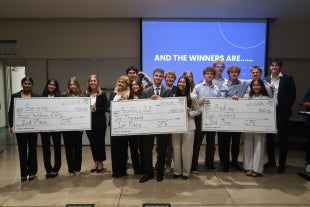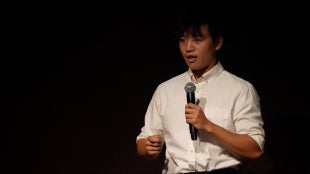Cal Poly Named a 2022 AASHE Sustainability Award Winner
Contact: Kylee Singh
klsingh@calpoly.edu; 805-756-5397
University is among six California State University campuses honored for combined efforts to improve how climate change is taught to students
SAN LUIS OBISPO — Cal Poly is among six California State University campus partners to share global recognition for their efforts to reshape how the system teaches its nearly half a million students about climate change.
The Association for the Advancement of Sustainability in Higher Education — the leading organization for the advancement of sustainability in colleges and universities across 48 states, a U.S. Territory, nine Canadian provinces and 20 countries — bestows its prestigious awards on the institutions and individuals that help lead higher education to a sustainable future.
In 2022, AASHE announced 12 winners from 430 entries in five categories. The CSU entry received the coveted Campus Sustainability Achievement Award. Entries were judged on overall impact, innovation, stakeholder involvement, clarity and other criteria specific to each category.
“The 2022 AASHE Sustainability Award winners demonstrate an inspiring passion for progressing sustainability at their campus,” said AASHE Executive Director Meghan Fay Zanier. “They are raising the bar and evolving what sustainability in higher education looks like.”
Cal Poly was honored for its collaborative effort with five other CSU campuses — Chico, Humboldt, Monterey Bay, San Marcos and Stanislaus — to establish the CSU Faculty Learning Community in Teaching Climate Change and Resilience.
Last spring, 62 faculty members representing over 30 disciplines participated in the first multi-campus Faculty Learning Community in CSU history. Typically, FLCs are a faculty group on a single campus that collaborates during a semester or academic year to provide discussion, learning and development of relevant teaching practice, scholarship and community building.
During seven 90-minute sessions of the multi-campus FLC, participants covered the science behind climate change, solutions available to counter it, the need to incorporate social and environmental justice into the conversation, and the enormous anxiety all of this produces in students. The community members listened to more than 20 speakers from inside and outside academia. Faculty also talked about taking their teaching outside the classroom with discussions on civic engagement and using campus as a living lab. By June, over 75 classes spanning all fields of study, “from Polymers to Plato,” had been redesigned to include greater engagement of climate change and resilience.
“Having played a lead organizing role in this faculty learning community was a great experience,” said Kylee Singh, Cal Poly’s sustainability coordinator. “At Cal Poly we had over 20 faculty apply for 10 budgeted stipends. Hopefully, we can grow this program in the future since it was such a huge success.”
The effort is already paying dividends.
A Cal Poly faculty member developed a Solutions Project for her Sustainability in the Experience Industry course. This industry is a cornerstone of American culture that contributes hundreds of billions of dollars to US and global economies through event planning, sport management, travel, hospitality, tourism, destination management, leisure, and parks and recreation.
Using resources and tools learned in the FLC, Professor Jerusha Greenwood taught her students how to research solutions being developed in related and supporting industries to better address sustainability.
“Students conduct research on issues challenging the sustainability of meetings and corporate events, major sporting events, tourism and hospitality, and outdoor recreation,” she said. “They can use these tools in the future as emerging professions in a field that will be faced with adapting to and mitigating some of the most severe impacts of climate change.”
In Cal Poly’s College of Engineering, Professor Dianne DeTurris had her senior aerospace engineering students attend last October’s Climate Solutions Now campus conference that featured more than 65 talks and discussions in a dozen parallel tracks on climate change and sustainability issues, including for the first time, an aviation track. Students attended two sessions and wrote about one as an assignment.
“Their insights from attending the conference helped me a great deal to figure out what students know and how to best engage them in the classroom on the topic of reducing carbon emissions in aerospace systems,” DeTurris said.
Students across the state will also benefit. The CSU — the largest public university system in the U.S. with 477,000 students and 56,000 faculty and staff — educates the most ethnically, economically and academically diverse student body in the nation. Its 23 campuses and seven off-campus centers stretch 800 miles from Humboldt south to San Diego.
CSU sustainability leaders have long collaborated to provide collective programming for their individual campuses. Most recently, sustainability officers from across the system united to coordinate a series of events focused on the themes of climate justice, environmental racism and intersectional sustainability. Together the CSU has hosted a multi-campus series, Climate Justice = Social Justice: Conversations Exploring the Intersections of People, Planet & Power. And last spring ,they hosted the CSU’s headlining Earth Day event, Taking Action for People and the Planet, for which they were recognized as a finalist in 2021 for this same award.
AASHE honored its 12 award recipients in a Dec. 8 virtual awards ceremony.
Award recipients receive recognition in a variety of formats, including a plaque from Rivanna Natural Designs, a woman-owned B Corp with a strong commitment to sustainability. Since AASHE’s 2006 founding, 135 campuses and people have been recognized through its prestigious award program.
To read more about AASHE’s awards programs, please visit http://www.aashe.org/get-involved/awards/.
About the Association for the Advancement of Sustainability in Higher Education (AASHE)
AASHE empowers higher education administrators, faculty, staff and students to be effective change agents and drivers of sustainability innovation. AASHE enables members to translate information into action by offering essential resources and professional development to a diverse, engaged community of sustainability leaders. The organization works with and for higher education to ensure that our world’s future leaders are motivated and equipped to solve sustainability challenges. For more information, visit www.aashe.org. Follow AASHE on Facebook and Twitter.
About Cal Poly
Founded in 1901 and part of the renowned California State University system since 1960, Cal Poly is a nationally ranked, four-year, comprehensive polytechnic public university located in San Luis Obispo, California. Known for its Learn by Doing approach, small class sizes and open access to expert faculty, Cal Poly is a distinctive learning community whose more than 21,000 academically motivated students enjoy an unrivaled hands-on educational experience that prepares them to lead successful personal and professional lives. For more information, visit calpoly.edu.
About Cal Poly Energy, Utilities and Sustainability
Cal Poly Energy, Utilities, and Sustainability, a unit of Facilities Management and Development, is dedicated to the responsible management of the natural resources that impact campus operations. Electricity, natural gas, water and various other resources are critical to operating a successful university, and the sustainable use of these resources is a driving force in Cal Poly campus planning and operations. A renowned leader in sustainability efforts, Cal Poly has received 34 Best Practice Awards from the UC/CSU/CCC Energy Efficiency Partnership Program. The campus has also earned significant CSU funding and utility incentives for energy conservation and continues to be named a Tree Campus USA and Best Workplace for Commuters. For more information, visit sustainability.calpoly.edu.


